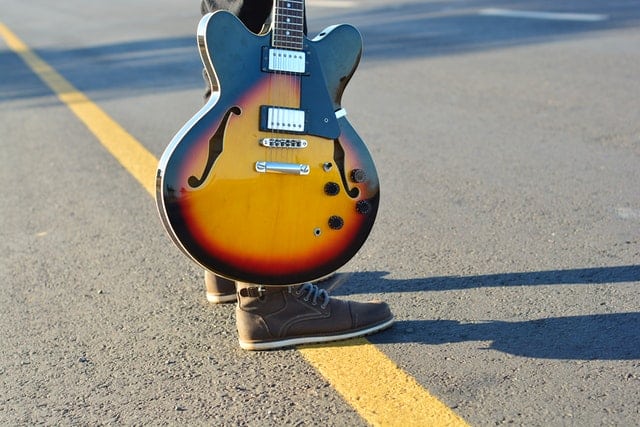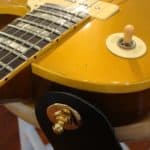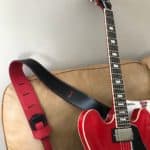Guitars are valuable.
Any guitarist will tell you their guitars are the number one source of happiness they have.
Not to mention, they are also a source of income for many.
One way or another, the value of the instrument cannot be denied.
With this in mind, it is no surprise to see musicians taking extreme safety measures with their instruments.
They guard them in quality cases to avoid harsh weather and hot temperatures.
They rechange the strings every now and then to avoid rusty string from denting the fretboard.
And so on.
However, chaos lurks everywhere, and sometimes problems arise out of nowhere.
Arguably, the most common one is when the guitar just slips out of your hands, and falls flat on the floor. In other words, when you drop the instrument.
After all, is there a guitarist that hasn’t dropped their guitar once in their lifetime? I highly doubt it.
Unfortunately, even if you are the lucky one who has never faced this issue, you can be sure it will occur sooner or later.
Now, what will happen when that situation takes place? Will a guitar break once dropped?
A guitar could get damaged after being dropped. Luckily, guitars are solid instruments, which means that, more often than not, the guitar won’t present significant issues. All in all, it is more plausible for the guitar to have marks or cracks than to be broken and unrepairable.
If this has occurred to you, do not panic!
There are lots of ways to solve any inconvenience the guitar presents, and here we’ll tell you which are those.
Also, we’ll discuss which are the most sensitive areas of a guitar, and how to prevent the instrument from being dropped a second time (or the first time, if it hasn’t occurred yet).
Let’s go!
Will a guitar be damaged if dropped?
Dropping your guitar could damage the instrument, especially if it receives a hit at a critical area.
For instance, if a guitar falls and receives a strike in the headstock, then the probabilities of it getting badly damaged are higher compared to other parts.
However, it is safe to say guitars are solid instruments and they resist a good deal of blows.
All in all, there are a wide variety of factors to take into account when answering this question.
After all, the height, the material the guitar is made of, the quality of the instrument, and the area where it has received the hit, all play a drastic role at the time of deciding whether the guitar needs a check-up or not.
How high is too high for a guitar to be dropped?
In reality, there is no specific answer to this question.
Once again, even if the guitar falls from a relatively low height, it will get ruined if the blow is received in the headstock or any other sensitive part.
Now, it is obvious that the higher the height that the guitar is dropped from, the most likely it is to get harmed.
Of course, if you throw a guitar from a 32 feet building, then be sure the instrument cannot be saved at all.
Luckily, dropping a guitar from 32 feet is a not-likely-to-occur scenario.
On the contrary, if the guitar is dropped, then it will probably occur while you are rehearsing with a band, or practicing while standing up on your own.
In that case, the instrument would hit the floor after falling from a distance of 3 or 4 feet approximately.
In that case, it is probable that the guitar only gets a mark in the area where it received the hit. Other than that, it won’t present irremediable issues.
But remember, it always depends on the situation and the area where the strike is received.
What is the most common kind of damage from dropping a guitar?
The most common and present damages found in guitars that have been dropped are cracks and marks in the wood and guitar’s body.
Worst case scenario, the guitar’s body presents a hole in its body. That is, of course, in case the guitar was an acoustic or any other guitar whose body is hollow.
Other than that, just a dent or a crack will appear. Although these are not aesthetically appealing, they do not interfere with sound and playability.
What to do if you damage your guitar by dropping it?
The best thing you can do is ask for advice from the experts.
That is, take the guitar to a luthier and ask whether he or she can take a look at it and fix the instrument.
More often than not, broken parts of a guitar are either replaced or stuck with glue.
Maybe you understand about guitar’s structure and are able to fix it on your own. In that case, you’ll understand what approach to take, and how to repair it.
If you don’t, then it is always better to leave it to professionals.
Now, if you have doubts about whether the damage is too compromising or not, it is better to be safe than sorry. That is, take the guitar to a luthier and let them decide the next step.
Maybe it is not a big deal, or maybe it is, who knows?
What’s really important here is that you take the instrument to the artisan as soon as possible. Fail to do that, and you run the risk of compromising the structural integrity of the instrument.
Are there some guitar models that are more fragile than others?
There are no specific models that are more resistant than others.
In any case, we could argue that bigger electric guitars are more resistant than smaller ones.
However, electric guitars are made of solid wood, which means that even if the instrument is thinner, it doesn’t necessarily mean that it is more likely to break.
All in all, the ones that are most likely of getting the most noticeable damage are acoustic guitars.
Although these instruments are resistant as well, the disadvantage is that their bodies are hollow.
This makes it more likely of having bigger cracks.
Now, even if you drop an acoustic guitar, you still have a chance of it not having drastic, unrepairable damages.
How to avoid dropping your guitar?
The best solution to an issue is to avoid the issue beforehand.
So, instead of fixing a broken guitar, try to prevent breaking it, to begin with.
For example, instead of using normal guitar straps, see if you can purchase guitar straps with lockers. That way, you are preventing the instrument from falling all of a sudden.
Also, here’s a cheap quick-fix: in case the hole in the straps is too big (therefore, making the guitar more likely to fall), just add some duck tape around the strap pins with the strap already put on the strap pins.
That way, you ensure the strap is tightly secure and unable to fall.
In addition, try not to move too much while rehearsing. Sometimes, a guitar is dropped after moving from one corner to the other, so the strap gets loose and the guitar hits the floor.
Lastly, always leave the guitar inside a case once you are finished playing. If you leave the instrument gently lying against the wall, then it runs the risk of falling and receiving a blow.
Be careful. If you follow this advice, you can rest assured knowing that the guitar will not slip from your hands.

Hello there, my name is Ramiro and I’ve been playing guitar for almost 20 years. I’m obsessed with everything gear-related and I thought it might be worth sharing it. From guitars, pedals, amps, and synths to studio gear and production tips, I hope you find what I post here useful, and I’ll try my best to keep it entertaining also.





